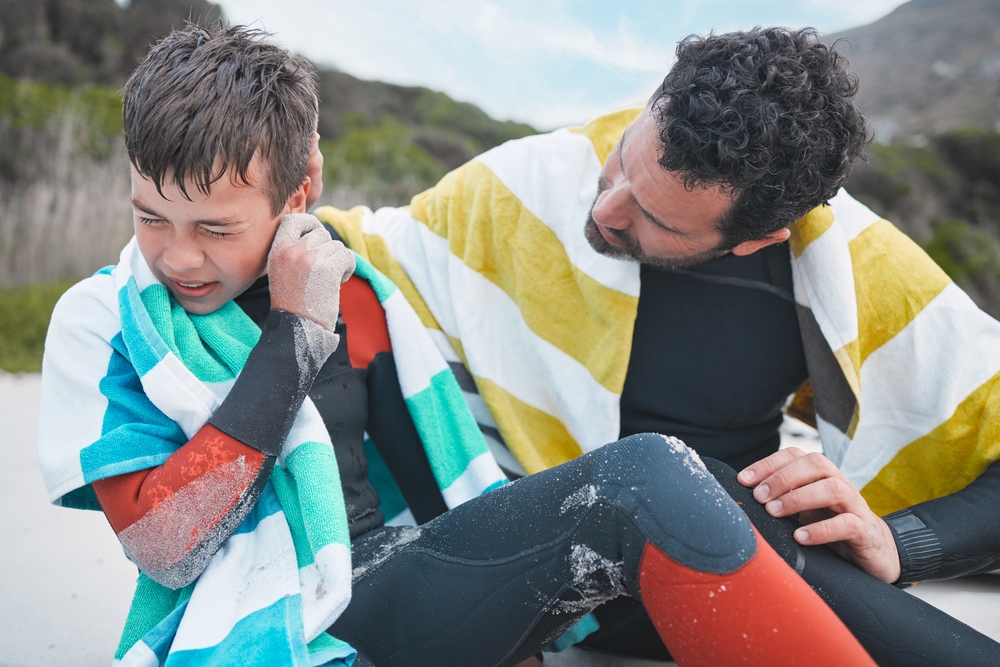 Summer brings sunshine, family fun, and a calendar full of outdoor events. But while you’re enjoying barbecues, beach trips, and fireworks, your hearing might be at risk. Noise exposure, water damage, and travel-related stress can all impact your hearing health, especially for older adults and those already using hearing aids.
Summer brings sunshine, family fun, and a calendar full of outdoor events. But while you’re enjoying barbecues, beach trips, and fireworks, your hearing might be at risk. Noise exposure, water damage, and travel-related stress can all impact your hearing health, especially for older adults and those already using hearing aids.
At Eldorado Hearing, we want to help you enjoy everything summer offers, without compromising your hearing. In this article, we’ll show you how to protect your hearing during summer activities like swimming, live music events, and vacations. Whether you’re new to hearing aids or noticing signs of hearing loss, these practical tips are for you.
Why Summer Can Be Tough on Your Hearing
Summer activities often expose people to loud environments, humid weather, and frequent water exposure, all of which can cause or worsen hearing loss. According to the CDC, around 48 million Americans live with some degree of hearing loss, and one in four of those cases may be caused by exposure to loud noise.
Top Seasonal Hearing Risks:
| Summer Activity | Hearing Risk |
| Swimming | Water trapped in the ear (can cause infection) |
| Fireworks & Concerts | Loud, impulsive noise (>120 dB) |
| Outdoor Work & Yard Tools | Prolonged noise from lawnmowers, chainsaws |
| Travel (Airplanes) | Rapid pressure changes; inner ear stress |
| Heat & Sweat | Can damage hearing aids |
1. Protecting Your Hearing at Pools and Beaches
Water may feel refreshing on a hot day, but pool water, lake bacteria, and moisture can increase the risk of swimmers’ ear and other infections, especially for those using hearing aids.
Tips for Hearing Safety in the Water:
- Use custom swim earplugs to prevent water from entering the ear canal.
- Dry ears thoroughly after swimming using a towel or the tilt-and-drain method.
- Avoid inserting objects like cotton swabs, which can push moisture deeper.
- If you wear hearing aids, store them in a dry, ventilated container while swimming.
- Consider investing in a hearing aid dehumidifier during humid months.
Fun fact: Swimmer’s ear (otitis externa) is most common during summer and accounts for 2.4 million doctor visits annually in the U.S.
2. Concerts and Fireworks: Managing Exposure to Loud Sounds
Fireworks can reach up to 155 decibels, and summer concerts regularly exceed 100 decibels, both well above the safe exposure limit of 85 dB.
Safe Listening Strategies:
- Bring foam or custom earplugs to concerts, festivals, and firework displays.
- Keep a safe distance (at least 500 feet) from fireworks.
- Take listening breaks during long events to give your ears a rest.
- Consider volume-limiting ear protection for children.
Remember: Hearing damage from loud noise is cumulative and often permanent. Protecting your hearing now reduces your risk of long-term hearing loss.
3. Traveling with Hearing Aids: Plan Ahead
Whether flying, cruising, or road-tripping, summer travel introduces new challenges for hearing aid users. High altitudes, humidity, and unfamiliar settings can all interfere with hearing health.
Travel Tips for Hearing Aid Users:
- Pack extra batteries or a charging station (especially for longer trips).
- Store hearing aids in a dry, hard case to protect from moisture and impact.
- Alert TSA or airline staff if you need help with communication during boarding.
- Download travel apps that offer visual alerts or captions for accessibility.
- Keep a printed copy of your hearing aid settings or clinic contact info in case of technical issues.
Bonus: Many newer hearing aids are Bluetooth-enabled, allowing you to stream GPS directions, airline notifications, or phone calls straight to your ears.
4. Outdoor Work and Yard Equipment
Power tools such as lawnmowers, leaf blowers, and chainsaws typically produce 90–110 decibels, enough to damage hearing in under 15 minutes.
How to Stay Safe:
- Wear over-ear protective earmuffs when operating power tools.
- Limit use to short intervals and take breaks.
- Choose quieter, battery-powered equipment when possible.
If you notice a buzzing or muffled sensation in your ears after yard work, it could be a sign of temporary threshold shift, a warning of potential long-term damage.
Q&A: Common Summer Hearing Questions
Q: Can sunscreen or sweat damage hearing aids?
A: Yes. Moisture, oils, and creams can clog microphone ports or cause corrosion. Clean hearing aids daily and keep them away from sunscreen during application.
Q: Is it okay to fly with hearing aids on?
A: Absolutely. Hearing aids are safe for flights. You may even hear better on the plane if you keep them on, especially with cabin announcements.
Q: Can summer allergies affect my hearing?
A: Yes. Allergies can cause ear congestion, leading to temporary hearing loss or tinnitus. If symptoms persist, contact a hearing care provider.
Hearing Loss Doesn’t Take a Vacation
Don’t let untreated hearing loss or poorly maintained hearing aids interfere with your summer. Hearing health is year-round, but seasonal activities require extra care. The good news is that a few small adjustments can protect your ears while you enjoy the best of summer.
Whether you’re relaxing poolside, watching fireworks with family, or jet-setting across the country, hearing protection should be part of your summer checklist.
Schedule a Summer Hearing Checkup with Eldorado Hearing
At Eldorado Hearing, we offer personalized hearing care, hearing aid services, and evaluations designed to keep you hearing your best, every season. Our team can help you:
- Select the right hearing protection for summer activities
- Troubleshoot and maintain hearing aids in warm weather
- Identify signs of hearing loss that may go unnoticed
Don’t miss out on the sounds of summer. Schedule a hearing consultation today at eldoradohearing.com or call us to learn more.



Leave a Reply